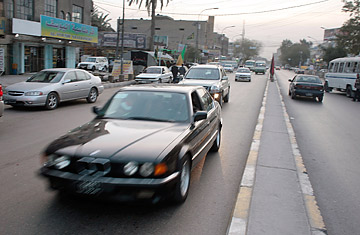
One of the signs of the increased sense of security in Iraq in the last year is the presence of recent model cars on the city streets.
"What do you want to go to Iraq now for?" joked a journalist in New York. "It's all quiet."
I thought about this joke a few days later on my first plane ride into Baghdad International Airport. The descent, once famous for its harrowing, evasive corkscrew maneuver, was peaceful. We looped around the airport, above long rows of tan army tents at camps Liberty and Victory, delayed only by a small dust storm. In the row behind me, Iraqi gentlemen in blazers laughed the whole way. A few aisles up, a mountainous, tattooed contractor dozed in headphones.
However, Iman, the woman sitting next to me, nervously pressed her face to the window and confessed that she was scared — not so much of the flight, she said, as just coming to Baghdad. She was Kuwaiti, she explained, and had not been to Baghdad in 20 years. She had come to sell a house she owned but had never lived in. "My husband said I must not go, but I must," she told me. "'Baba,' I said, 'It is in God's hands.'" She was particularly nervous because her friends in Baghdad had told her they could not meet her at the airport. She would have to take a taxi or bus to a square nearby and meet them. There were only a handful of women on the plane, and Iman pointed to one in a headscarf seated ahead of us. "I asked this lady if she could show me how to do it," Iman told me, "but she said no. The people here do not want to trust anyone."
I don't know what became of Iman. Aided by a fixer, I cleared immigration quickly and without incident. Likewise without a problem, TIME's Iraqi security detail drove me into the center of the city on what used to be called the Highway of Death. We passed through several checkpoints on the way that were manned by the Iraqi army and in one case by Ministry of the Interior forces. In each case, the guards waved us through. Above, a pair of Black Hawk helicopters crossed the sky. (See pictures of daily life returning to normal in Baghdad.)
In my meetings that day, the city's electricity — or "Maliki power," as the residents call it after Iraq's increasingly powerful Prime Minister — occasionally went down. No one was ever surprised; we would continue talking in darkness until a generator started up. According to the Brookings Institution's Iraq Index, in January this year average Baghdadis were getting 13 hours of electricity per day, up from seven in 2008. A lot of statistics suggest that life in Iraq is improving — though, in the case of electricity, the same index estimated prewar levels to be 16 to 24 hours a day.
But who cares about services, some would wonder, when there has been a change in leadership? Saddam is not in charge. And maybe now, maybe soon, neither will the United States. As I was headed into the Green Zone the next day to pick up my credentials, an Iraqi army soldier stopped me. He did not want to let me through his checkpoint. Through a translator, he said that I would need a military escort to come get me, though the reporter I was with said no one had ever needed one before. A young U.S. Army soldier nearby agreed that it didn't make sense and apologized to me. Sorry, he said, I can't help you — the Iraqis are in charge now. Eventually I piggybacked in with a South African contractor working for the Department of Defense.
Whoever is in charge, the security situation is much improved. I do not hear explosions every morning, as reporters used to. But for all I have heard about improved security, no one I have met here acts as though Baghdad, outside the Green Zone, is really a secure place. There are still blast walls and precautions and nerves, though of course 6½ million people live here, as they must. Maybe the numbers speak for themselves. On Feb. 19, 2008, Iraqi Body Count, one of the several contentious projects to record violent civilian deaths, reported 37 dead. On the same date a year later, as I arrived, it reported 9 dead, plus 17 bodies discovered in a mass grave for a total of 26. Amid whatever change has come, or is coming, these were the numbered dead.
